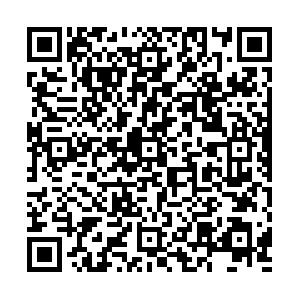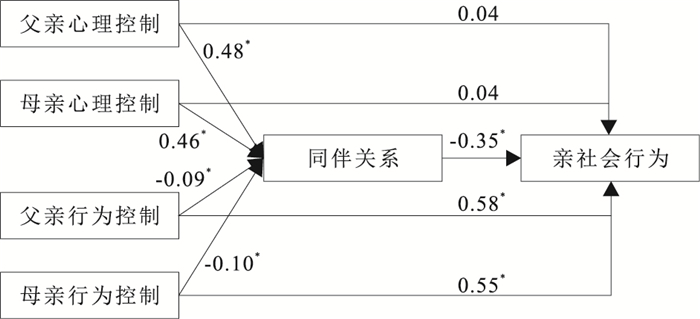Relationship of parental control and peer relationship with pro-social behavior among junior high school students
-
摘要:
目的 探讨父母控制水平、同伴关系和初中生亲社会行为的关系,为促进青少年亲社会行为提供方法和策略。 方法 2022年6—7月,采用方便抽样与整群随机抽样相结合的方法在安徽省宿州市和宣城市各抽取3所初中学校,对抽中学校初一至初三年级的2 564名学生进行问卷调查,包括父母控制问卷、亲社会量表和青少年同伴关系量表。相关性分析采用Pearson相关分析,计量资料比较选用t检验或方差分析,中介效应分析采用Process过程分析。 结果 男生在父母控制总分及父亲心理控制、母亲心理控制、父亲行为控制、母亲行为控制4个维度的得分(185.31±27.49,21.65±7.43,21.77±8.18,69.50±11.41,72.39±11.53)均高于女生(178.21±25.13,20.08±7.09,20.61±7.62,66.56±11.14,70.95±11.84)(t值分别为6.83,5.47,3.70,6.60,3.12),女生的同伴关系得分高于男生(48.41±11.26,47.13±10.84)(t=2.95)(P值均 < 0.01)。不同年级中学生父母控制、父母心理控制、母亲心理控制、父亲行为控制、母亲行为控制、同伴关系、亲社会行为得分差异均有统计学意义(F值分别为9.44,12.87,13.61,6.84,4.12,42.85,2.98,P值均 < 0.05)。父母控制得分与亲社会行为得分呈正相关,亲社会行为得分与同伴关系得分呈负相关(r值分别为0.32,-0.19,P值均 < 0.01)。同伴关系在父母控制和亲社会行为之间起部分中介作用,中介效应值为-0.02,占总效应的6.79%;同伴关系在父母心理控制和亲社会行为之间存在遮掩效应。 结论 过高的父母控制水平与初中生亲社会行为减少相关,而良好的同伴关系会作为媒介增加初中生的亲社会行为。良好的家庭教养方式及引导青少年积极的同伴交往,有利于促进其行为规范和社会化的发展。 Abstract:Objective To explore the relationship of parental control and peer relationship with pro-social behavior among junior high school students, so as to provide methods and strategies for promoting pro-social behavior among junior high school students. Methods From June to July 2022, a combination of convenience sampling and cluster random sampling methods was used to select three junior high schools from Suzhou and Xuancheng in Anhui Province. A total of 2 564 students from the first to the third year of junior high school were administered questionnaires, including the Parental Control Questionnaire, the Pro-social Scale, and the Adolescent Peer Relationship Scale. Measurement data was analyzed by t-test or ANOVA, correlation analysis by Pearson correlation analysis, and mediation effect analysis by Process analysis. Results Boys (185.31±27.49, 21.65±7.43, 21.77±8.18, 69.50±11.41, 72.39±11.53) scored higher than girls (178.21±25.13, 20.08±7.09, 20.61±7.62, 66.56±11.14, 70.95±11.84) in the parental control and four dimensions of father psychological control, mother psychological control, father behavioral control and mother behavioral control (t=6.83, 5.47, 3.70, 6.60, 3.12), and girls scored higher than boys on peer relationship (48.41±11.26, 47.13±10.84)(t=-2.95) (P < 0.01). There were statistically significant differences in scores for parental control, parental psychological control, maternal psychological control, paternal behavioral control, maternal behavioral control, peer relationships, and pro-social behavior among junior high school students of different grades (F=9.44, 12.87, 13.61, 6.84, 4.12, 42.85, 2.98, P < 0.05). Parental control scores were positively correlated with pro-social behavior scores, and pro-social behavior scores were negatively correlated with peer relationships scores (r=0.32, -0.19, P < 0.01). Peer relationships partially mediate between parental control and pro-social behavior, with a mediation effect value of -0.02, accounting for 6.79% of the total effect.And there was a masking effect between parental psychological control and pro-social behavior. Conclusions Excessive parental control is associated with the decrease of pro-social behaviors among junior high school students, while good peer relationship acts as a mediator to increase pro-social behavior among junior high school students. Therefore, good family parenting styles and guiding adolescents to positive peer interactions are conducive to promoting the development of behavioral norms and socialization and fostering pro-social behavior. -
Key words:
- Legal guardians /
- Interpersonal relations /
- Social behavior /
- Mental health /
- Students
1) 利益冲突声明 所有作者声明无利益冲突。 -
表 1 不同组别初中生父母控制、同伴关系和亲社会行为得分比较(x±s)
Table 1. Comparison of scores on parental control, peer relationships, and prosocial behavior among junior high school students of different groups(x±s)
组别 选项 人数 统计值 父母控制 父亲心理控制 母亲心理控制 父亲行为控制 母亲行为控制 同伴关系 亲社会行为 性别 男 1 281 185.31±27.49 21.65±7.43 21.77±8.18 69.50±11.41 72.39±11.53 47.13±10.84 91.29±19.40 女 1 283 178.21±25.13 20.08±7.09 20.61±7.62 66.56±11.14 70.95±11.84 48.41±11.26 90.34±17.15 t值 6.83 5.47 3.70 6.60 3.12 -2.95 1.31 P值 < 0.01 < 0.01 < 0.01 < 0.01 < 0.01 < 0.01 0.19 年级 初一 910 184.67±27.18ab 21.83±7.29ab 22.15±8.07ab 68.81±10.95b 71.88±10.78b 50.21±9.57a 89.80±20.05ab 初二 886 180.98±25.46 20.16±7.82 20.21±7.55 68.29±11.69c 72.31±12.08c 45.47±11.67c 91.91±17.42 初三 768 179.21±26.79 20.53±7.22 21.17±8.06 66.81±11.39 70.70±12.26 47.54±11.43 90.74±17.06 F值 9.44 12.87 13.61 6.84 4.12 42.85 2.98 P值 < 0.01 < 0.01 < 0.01 < 0.01 0.02 < 0.01 0.05 注: a初一与初二比较,P < 0.05;b初一与初三比较,P < 0.05;c初二与初三比较,P < 0.05。 表 2 同伴关系对父母控制与初中生亲社会行为的中介效应(n=2 564)
Table 2. Mediating effects of peer relationships on parental control and prosocial behavior among junior high school students(n=2 564)
结果变量 预测变量 B值(95%CI) t值 亲社会行为 父亲心理控制 0.04(-0.06~0.14) 0.85 母亲心理控制 0.04(-0.04~0.14) 1.07 父亲行为控制 0.58(0.53~0.64) 19.48* 母亲行为控制 0.55(0.50~0.61) 19.11* 同伴关系 父亲心理控制 0.48(0.42~0.53) 16.67* 母亲心理控制 0.46(0.40~0.51) 17.29* 父亲行为控制 -0.09(-0.12~-0.05) -4.38* 母亲行为控制 -0.10(-0.14~-0.06) -5.33* 亲社会行为c' 父亲心理控制 0.20(0.11~0.31) 4.13* 母亲心理控制 0.20(0.12~0.31) 4.50* 父亲行为控制 0.55(0.50~0.62) 18.94* 母亲行为控制 0.52(0.47~0.58) 18.38* 注: *P < 0.05;c'表示同伴关系进入回归方程后,父母心理和行为控制对亲社会行为的回归系数。 -
[1] MILES A, ANDIAPPAN M, UPENIEKS L, et al. Using prosocial behavior to safeguard mental health and foster emotional well-being during the COVID-19 pandemic: a registered report protocol for a randomized trial[J]. PLoS One, 2021, 16(1): e0245865. doi: 10.1371/journal.pone.0245865 [2] COUREL-IBÁÑEZ J, SÁNCHEZ-ALCARAZ B J, GÓMEZ-MÁRMOL A, et al. The moderating role of sportsmanship and violent attitudes on social and personal responsibility in adolescents: a clustering-classification approach[J]. PLoS One, 2019, 14(2): e0211933. doi: 10.1371/journal.pone.0211933 [3] WANG W, CHEN S, WANG S, et al. Parental burnout and adolescents' development: family environment, academic performance, and social adaptation[J]. Int J Environ Res Public Health, 2023, 20(4): 2774. doi: 10.3390/ijerph20042774 [4] ZHU X, SHEK D T L. Parental control and adolescent delinquency based on parallel process latent growth curve modeling[J]. Int J Environ Res Public Health, 2021, 18(17): 8916. doi: 10.3390/ijerph18178916 [5] CONG E Z, CAI Y Y, WANG Y, et al. Association of depression and suicidal ideation with parenting style in adolescents[J]. Chin J Contemp Pediatr, 2021, 23(9): 938-943. [6] RAVINDRAN N, HU Y, MCELWAIN NL, et al. Dynamics of mother-adolescent and father-adolescent autonomy and control during a conflict discussion task[J]. J Fam Psychol, 2020, 34(3): 312-321. doi: 10.1037/fam0000588 [7] ZHU X, SHEK D T L. Parental control and adolescent delinquency based on parallel process latent growth curve modeling[J]. Int J Environ Res Public Health, 2021, 18(17): 8916. doi: 10.3390/ijerph18178916 [8] SHEK D T L, ZHU X. Paternal and maternal influence on delinquency among early adolescents in Hong Kong[J]. Int J Environ Res Public Health, 2019, 16(8): 1338. doi: 10.3390/ijerph16081338 [9] SHEK D T L, ZHU X, DOU D, et al. Influence of family factors on substance use in early adolescents: a longitudinal study in Hong Kong[J]. J Psych Drugs, 2020, 52(1): 66-76. doi: 10.1080/02791072.2019.1707333 [10] MAUNDER R, MONKS C P. Friendships in middle childhood: links to peer and school identification, and general self-worth[J]. Br J Dev Psychol, 2019, 37(2): 211-229. doi: 10.1111/bjdp.12268 [11] BOELE S, VAN DER GRAAFF J, DE WIED M, et al. Linking parent-child and peer relationship quality to empathy in adolescence: a multilevel Meta-analysis[J]. J Youth Adolesc, 2019, 48(6): 1033-1055. doi: 10.1007/s10964-019-00993-5 [12] WANG Q, POMERANTZ E M, CHEN H. The role of parents' control in early adolescents' psychological functioning: a longitudinal investigation in the United States and China[J]. Child Dev, 2007, 78(5): 1592-1610. doi: 10.1111/j.1467-8624.2007.01085.x [13] SHEK D T L. Assessment of perceived parental psychological control in Chinese adolescents in Hong Kong[J]. Res Soc Work Pract, 2006, 16(4): 382-391. doi: 10.1177/1049731506286231 [14] SHEK D T L. Perceived parental control and parent-child relational qualities in Chinese adolescents in Hong Kong[J]. Sex Roles, 2005, 53(9/10): 635-646. [15] 陈珂. 家庭教养方式对儿童攻击性行为的影响: 同伴关系的中介作用[D]. 西宁: 青海师范大学, 2019.CHEN K. The effects of family parenting styles on children's aggressive behavior: the mediating role of peer relationships[D]. Xining: Qinghai Normal University, 2019. (in Chinese) [16] 寇彧, 洪慧芳, 谭晨, 等. 青少年亲社会倾向量表的修订[J]. 心理发展与教育, 2007, 23(1): 112-117.KOU Y, HONG H F, TAN C, et al. Revisioning prosocial tendencies measure for adolescent[J]. Psychol Dev Educ, 2007, 23(1): 112-117. (in Chinese) [17] 温忠麟, 叶宝娟. 中介效应分析: 方法和模型发展[J]. 心理科学进展, 2014, 22(5): 731-745.WEN Z L, YE B J. Analyses of mediating effects: the development of methods and models[J]. Adv Psychol Sci, 2014, 22(5): 731-745. (in Chinese) [18] 韩慧, 缪鹏程, 王元明, 等. 中学生攻击行为与父母心理行为控制的相关性[J]. 中国学校卫生, 2020, 41(9): 1346-1349. doi: 10.16835/j.cnki.1000-9817.2020.09.018HAN H, MIAO P C, WANG Y M, et al. Relationship between parental control and aggressive behavior of middle school students[J]. Chin J Sch Health, 2020, 41(9): 1346-1349. (in Chinese) doi: 10.16835/j.cnki.1000-9817.2020.09.018 [19] YANG G, CHEN Y, YE M, et al. Relationship between family risk factors and adolescent mental health[J]. J Gent South Univ (Med Sci), 2023, 48(7): 1076-1085. [20] VANNUCCI A, OHANNESSIAN C M, FLANNERY K M, et al. Associations between friend conflict and affective states in the daily lives of adolescents[J]. J Adolesc, 2018, 65: 155-166. doi: 10.1016/j.adolescence.2018.03.014 [21] POTTER J R, YOON K L. Interpersonal factors, peer relationship stressors, and gender differences in adolescent depression[J]. Curr Psychiatry Rep, 2023, 25(11): 759-767. doi: 10.1007/s11920-023-01465-1 [22] SHIN K M, CHO S M, SHIN Y M, et al. Effects of early childhood peer relationships on adolescent mental health: a 6-to 8-year follow-up study in South Korea[J]. Psychiatry Investig, 2016, 13(4): 383-388. doi: 10.4306/pi.2016.13.4.383 [23] GUO Z, HU Q, CHEN J, et al. The developmental characteristics of proactive and reactive aggression in late childhood: the effect of parental control[J]. Aggress Behav, 2024, 50(1): e22112. doi: 10.1002/ab.22112 [24] LEUNG J T Y, SHEK D T L, KWOK L M H, et al. Actor-partner interdependence of socially prescribed parenting perfectionism and parental control in Chinese families[J]. Fam Process, 2023, 62(2): 722-736. doi: 10.1111/famp.12794 [25] 朱海东, 窦晓晨, 周雪梅, 等. 父母控制对大学生亲社会行为的影响: 自尊的中介作用[J]. 兵团教育学院学报, 2021, 31(6): 25-31, 64.ZHU H D, DOU X C, ZHOU X M, et al. The effect of parental control on college students' pro-social behavior: the mediating role of self-esteem[J]. J Corps Educ Coll, 2021, 31(6): 25-31, 64. (in Chinese) [26] 张秀慧, 赵宝, 王志家, 等. 父母控制与儿童心理适应的关系: 儿童自我控制的中介作用[J]. 心理与行为研究, 2022, 20(2): 197-203.ZHANG X H, ZHAO B, WANG Z J, et al. Parental control and children's psychological adjustment: the mediating role of children's self-control[J]. Stud Psychol Behav, 2022, 20(2): 197-203. (in Chinese) [27] 王艳辉, 李董平, 孙文强, 等. 亲子依恋与初中生亲社会行为: 有调节的中介效应[J]. 心理学报, 2017, 49(5): 663-679.WANG Y H, LI D P, SUN W Q, et al. Parent-child attachment and prosocial behavior among junior high school students: moderated mediation effect[J]. Acta Psychol Sin, 2017, 49(5): 663-679. (in Chinese) [28] 杨晶, 余俊宣, 寇彧, 等. 干预初中生的同伴关系以促进其亲社会行为[J]. 心理发展与教育, 2015, 31(2): 239-245.YANG J, YU J X, KOU Y, et al. Intervention on peer relationship promoting middle school students' prosocial behavior[J]. Psychol Dev Educ, 2015, 31(2): 239-245. (in Chinese) [29] ALPASLAN A H, KOCAK U, AVCI K. Gender-related factors for depressive symptoms in turkish adolescents[J]. J Child Adolesc Psychiatr Nurs, 2016, 29(1): 23-29. doi: 10.1111/jcap.12131 [30] BUCHANAN C M, MCDOUGALL P. Predicting psychosocial maladjustment in emerging adulthood from high school experiences of peer victimization[J]. J Interpers Violence, 2021, 36(3/4): NP1810-NP1832. -







 下载:
下载:

